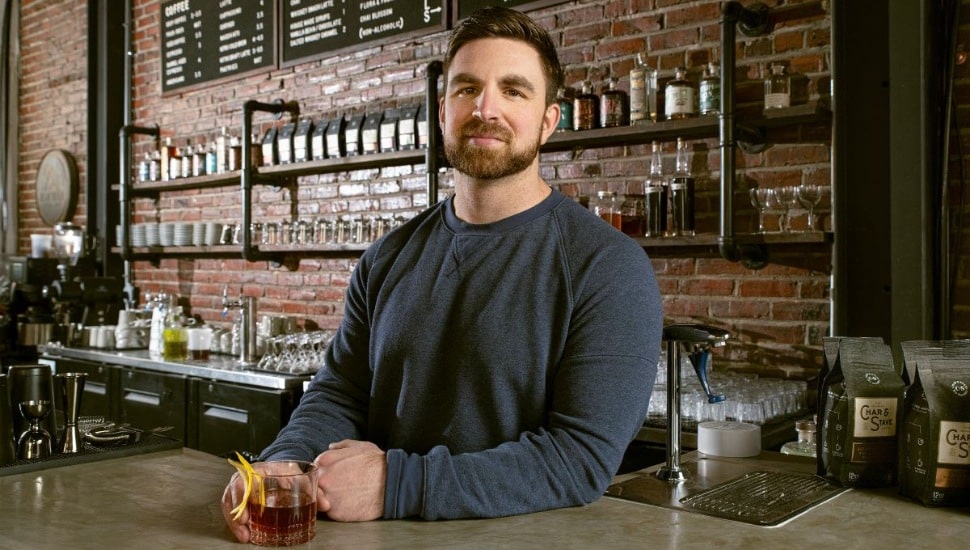Chester County Leadership: Jared Adkins, Owner, Bluebird Distilling and Char & Stave


Jared Adkins, owner of Phoenixville-based Bluebird Distilling and Char & Stave, a European-inspired coffee shop with locations in Chestnut Hill and Ardmore, grew up in Skippack.
His parents were also entrepreneurs who owned several daycares and a construction company, where Adkins worked as a teenager. After college, he discovered a passion for brewing beer and distilling.
Adkins recalled how being let go from his job provided the perfect opportunity to open the distillery he’d been dreaming of for years. During the pandemic, Bluebird Distilling also started roasting their own coffee, which led to the European-café-inspired Char & Stave, where people can get cocktail-esque coffee drinks in a relaxing environment.
Where were you born and where did you grow up?
I was born in Skippack, and I lived there the first 17 years of my life. When I was 17, I moved to the Schwenksville area with my family.
Where are you in the pecking order?
My family was like Yours, Mine and Ours. My dad was married prior, my mom was married prior. My dad had a daughter, my mom had a daughter and then they came together. I was the youngest. I was the only baby my parents had together.
What did your parents do?
My parents were entrepreneurs from the start. My mom was a biologist and a chemist for Merck. My dad was a union pipe insulator and started his own construction company at the same time.
When he and my mom had myself, they could not find any daycares, so the two of them had the bright idea to start a daycare. They started their first daycare 40 years ago called Short Stuff and Co. They ended up having four Short Stuff daycare centers throughout the years. I think being an entrepreneur was in my blood.
What do you remember about growing up in Skippack?
I grew up in a very rural neighborhood. We were the ones on the block having the local parties. It was that neighborhood where everybody came over for summertime parties– the good old days. A very close community where you’d walk around the block and know everyone that you’re running into.
Did you play any sports in high school?
I played football in high school. But at the same time, I was always interested in adventure or extreme sports, like surfing and snowboarding and fishing. I’ve had an intense passion for fishing my entire life.
What about jobs when you were growing up?
At 14, I was made to go get my working papers. I worked at a spot called Center Point Pond in Worcester for a couple summers. It’s a local fishing pond that worked with handicapped children some mornings and also had fishing and water gardens. I also had some restaurant jobs like bussing and dishing.
But around my sophomore year, I approached my father. I could make more money working for him in his construction business. I carried that through college. I also worked at Acme supermarket for a while, in the bakery.
What did you learn from working with your father that stays with you today?
Punctuality and ownership. From an early age, working with him, I felt extreme ownership. And he was good at giving me more exposure. As a 15- or 16-year-old, he was like, “Hey, I want you to go talk to this subcontractor that’s laying the plumbing and tell him this.” It might be something small, but it got me out of my comfort zone.
But then, even with the employees, I didn’t like people screwing around on the job. I didn’t like people who were taking advantage. So, for good or bad, I developed the habit of trying to set an example for them.
What music floated your boat in high school and college, Jared?
It’s clichéd – alternative ‘90s, like Goo Goo Dolls and Blink-182. I enjoy music and classic rock, but I’m not hugely obsessed with it. My mind’s usually just running by itself so intensely that I’ll just drive in the car and sit in silence half the time, lost in thought, not even realizing the radio’s not on.
I’m assuming you were a pretty good student. You could have gone anywhere to college. Where did you go to college and why there?
I was an awful student. I did not do well in high school. I’d go through the motions, but I had a hard time studying aspects that were not appealing to me. My senior year, I realized, “I need to get into college.” I got great grades, and my SATs were fine. I ended up going to Saint Francis University in western Pennsylvania.
When you look back over your career, who were the people that saw promise in you?
I went to a career fair at Penn State with a buddy. I just wanted the experience of interviewing. At the career fair, I started talking to a guy from Pepsi Cola. I was interested in sales. I gave him my resume, didn’t think anything of it, but I got invited to interview at the Pepsi factory.
There’s 60 people there, and it’s a three-day interview at Pepsi. I walked in, and they put me in the wrong group. I was applying for sales. They put me in the engineering group. At the time, I didn’t really care, didn’t think much of it. I interviewed against 30 engineers. My spiel was, “I’ve worked with blue-collar guys. I’m able to relate with these guys. I pick up stuff extremely quickly.” Two weeks later, I got the call back that I was offered the job, with one other girl, out of 30 engineers that applied.
I was on the floor as a shift supervisor in front of 50 individuals that were all older. It’s supposed to be a full year of training, like your master’s degree of machine engineering. Well, the other supervisors left about two to three months into it, and now we’re the front-line supervisors. At the same time, we were putting in this new blow-molding technology to make plastic bottles from scratch in the facility, and I was selected as the lead to manage that.
That was single-handedly the greatest thing for my career. I spent two years on running that project for Pepsi. After that, I could go wherever I wanted to go from there because I had Fortune 100 experience in engineering.
What do you think Pepsi saw in you, Jared?
Straightforward maturity and leadership. And a union environment is tough, especially as a younger person. You need to have that gritty, blue-collar background. You’re dealing with construction-style employees that are going to push you to the limits of what they can get away with.
Is there one person, as you look back over your career who saw something special in you?
We had this guy named Steve Mullen, who was the plant manager of our facility. I was very impressed by him – his executive presence, watching meetings, how he handled staff and other managers and his thought process. Whenever I could, I would find reasons to ask him, like, ‘Hey, I’m dealing with this on the floor. Could you give me your advice on how you would handle it?’ At the time, every piece of advice was mind-blowing to me. I’ve had many other leaders after that, but he stands out as someone that I looked up to.
So, tell me about Bluebird Distilling. How did you start it?
I spent two years at Pepsi, then I got another job with Nestle Waters in Allentown. I worked there in a leadership position for two years. In that time frame, I started brewing beer in my garage and fell in love with it. But I saw that there were a million breweries. I wanted to do something different.
I started looking into distilling. I didn’t know much about it – didn’t drink hard liquor. But then I turned and got obsessed with that. I started visiting any distillery I could. To get into the industry, I left Nestle and went over to Victory Brewing Company and was running their packaging department.
At the same time, I was working on a business plan. I ended up being in an argument with my direct supervisor over taking vacation that was set for six months prior. A week later, I was let go. But that was the greatest decision for me, because I wanted to do something else and I needed that kick in the butt.
I had this business plan ready. My dad came to me and said he’d be willing to invest some money. A family friend, Pierre, who used to work with us in construction, also offered to invest.
For the next couple of months, we started looking for locations. I found a spot on Bridge Street in Phoenixville that needed a lot of work. It had been empty for 11 years. I met with the Phoenixville Economic Development Association and told them, “My father and I have a construction background. We’ll gut this whole building and beautify it if you give us a cheap lease rate.”
As you look into the rest of 2024 and 2025, what are your priorities? What are you focused on?
We have a couple of new brands coming out, and we’re doing a large renovation to the distillery in Phoenixville starting in January.
We’re going to add a full-scale Neapolitan-style pizza kitchen and renovate our bar area. We’ve been primarily a cocktail bar, and now we’re adding food. Since we work with grain, pizza made the most sense.
Our distillers are interested in getting involved in making the dough, because it’s very similar.

Tell me about Char & Stave.
During COVID, we had two locations in Philadelphia that had to shut down. We actually did really well during that timeframe – I’m fortunate compared to some other businesses – but I was looking to branch out.
We would roast coffee in the back all the time – my distiller had a small roaster he’d bring in for fun. We always talked about it, and we were like, “Let’s get a roaster here and start an online business.” I bought a $50,000 coffee roaster – go big or go home. As we started roasting, my mind starts going, “We need a flagship coffee shop.”
I had been looking at a spot in Ardmore prior for a bar. And I love the European cafe style. I’ve been to Italy a lot. They’re open all day – they go from coffee right into cocktails and amaro in the evenings. We had the concept of this 7 a.m. to midnight, seven days a week coffee concept in Ardmore. It’s the first of its kind in Pennsylvania.
It took off insanely, instantly. Our mantra was “Coffee made by whiskey people.” The idea was, we’re good at mixology and craft cocktails. At Char & Stave, you have your traditional cappuccinos, espressos, but we have a whole non-alcoholic drip menu, where you can get espresso and tonic, espresso and a non-alcoholic amaro together, matcha mojitos or an old fashioned made from barrel-aged coffee.
It operates like a cool coffee shop in the morning, with a very different take on how you have your morning coffee, right into a cocktail bar in the evening. Since then, we’ve started another one at Chestnut Hill. All of us are blown away by how successful they’ve been. It’s just a calm environment where you can come out of the house and do whatever you want to do, whether you want to socialize or just sit by yourself.
So, what do you do with all your free time?
We got a dog in November of last year, so that pretty much sucks up all my extra time. And getting outside – like I said, I really like fishing and fly fishing.
Is there one fishing trip you remember that stands out as your favorite?
I went to a place called Libby Camps in Maine a few years ago. We spent a week there, and at 7:00 all the power goes out. You have propane heaters inside your cabin and a fireplace. It’s 60 miles off anywhere. No internet, no Wi-Fi. I brought a couple of books – I like to read, but I never get the time.
What books are on your nightstand right now?
I’m a nerd. Our dog is a Hungarian Vizsla, and he’s a bird dog. I have a bunch of books from the 1950s and the 1960s about bird dogs.
I like reading about business as well. When I was on that fishing trip, I read a 1993 Orvis book from the founder or one of the CEOs of Orvis about running the company in the ‘70s through the ‘90s, which was much different with catalogs and magazines. But all the principles are still the same.
Do you have a favorite author?
I’m really into poetry – I find it very relaxing. Going with the outdoor theme, Jim Harrison is my favorite author. He wrote the movie “Legends of the Fall.” I have all his books.
Three last questions, Jared. What’s something big that you’ve changed your mind about over the last 10 years?
When I started 12 years ago, if you started a distillery, there was a very set goal. Start a distillery, get into stores, put racks in different markets and grow. That was where my mind was at, so we did that. You sign with big distributors, you go to other states, but you’re not making any money. A lot of people have gone bankrupt and lost their businesses from chasing that.
I had to take a step back from that, as much as I wanted to be world-renowned, and ask myself, “What’s actually making us money?” I decided to pull out of markets that weren’t making us money and focus more on the home front – festivals, our tasting room, the coffee shops, stuff I can control. We have a much better chance of you buying a bottle if we can get you to come into our spot than coming into a liquor store.
It’s a crazy world, Jared. How do you stay hopeful and optimistic?
I have a lot to be hopeful and optimistic about. I got married last year, have a baby on the way. I have a dog, a great family, and a wonderful stepson.
But generally, my goal is to create a lifetime career for everybody that works for me. I would be happy with leaving everything where it’s at right now, if I could, and not having to ever grow again. The only reason I grow is to give staff more opportunities because I don’t want to lose people. I love the people that work for me. I stress myself out starting these new aspects so there are more opportunities and jobs for everyone to have a successful career. That is my objective with this business.
Finally, Jared, what’s the best advice you’ve ever received?
There’s so much advice. If I could say a person, it’d be single-handedly my father. I told him the stupid idea of starting a distillery for five years, and finally one day it stuck. Just daily advice, someone to put ideas without being judgmental, or vent to. With my mother and father, having someone that’s been through it before – that’s the most valuable thing to me because no one understands the nightmare that it can be sometimes, being on the hook for everything or having the ball drop for you, whether it’s employee issues or the livelihood of everyone there.
So having them and a couple other friends that own businesses as well – they’re my lifeline.
Connect With Your Community
Subscribe to stay informed!
"*" indicates required fields








![95000-1023_ACJ_BannerAd[1]](https://vista.today/wp-content/uploads/2023/03/95000-1023_ACJ_BannerAd1.jpg)











































